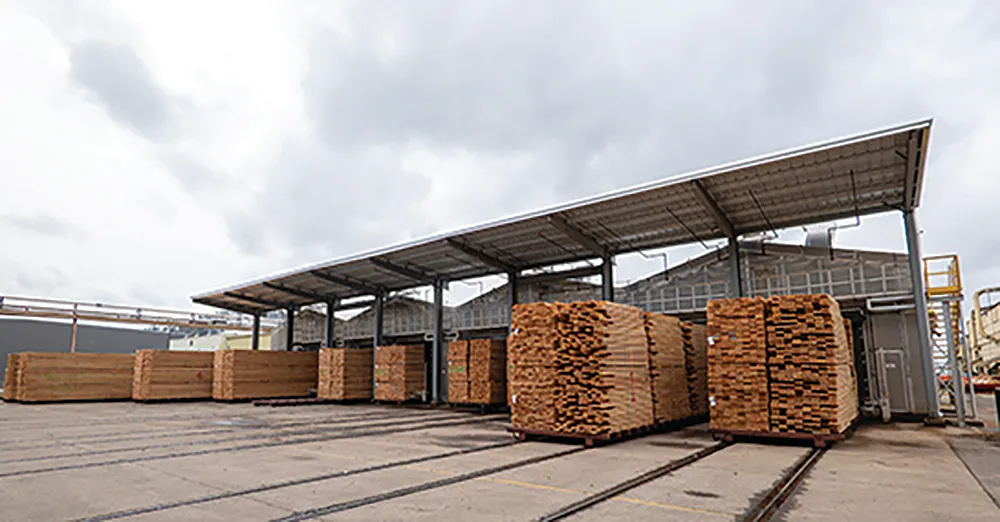Table of Contents
It has been said many times, by many people who swear allegiance to the lumber business, that “sawdust gets in your blood.” Translation: once you fall in love with this industry, it’s going to become a long-term affair!
That’s even more true, from my perspective, when you’ve been exposed to it at an early age and spent virtually your entire life surrounded by it. My brother, sister, and I—the fifth generation to own and operate Robbins Lumber Co.—grew up looking down on the family sawmill in Searsmont, Me. Our childhood was filled with the modern workings of mill production, including the thud of wood hitting the deck, the insistent beep of forklift backup alarms, and plumes from the smokestack curling up in the distance. Those sights and sounds were reinforced by the nostalgic retellings of how our grandfather took part in the last log drive down the river and how our great-grandfather hand built the wooden gears on the original water wheel. Today, our experiences will shape the stories told to future generations of the Robbins family.
The Family That Works Together…
It isn’t a foregone conclusion, however, that just because you have family roots in the industry, your own destiny is preordained. It just so happened that, for me, it was. After completing my post-secondary education, which included a Masters of Business Adminstration and a heavy dose of forestry coursework, a number of circumstances brought me back to Robbins Lumber. Not least among them were a lifelong love of the industry and a fierce respect for and loyalty to my father.
My sister and brother also found their way back to the family business, and I can’t think of a scenario that could have turned out better. We as siblings are extremely fortunate to get along amazingly well, using our different strengths and weaknesses to create balance and unity. When you have a nurturing, loving, and supporting family bond, you essentially have the foundation for a healthy working relationship and a strong personal and professional support network.
… Also Has to Work Harder
Sometimes, though, rising through the ranks of your family-owned business can mean having to put in a little extra effort to demonstrate that you have earned your position, and not merely had it handed to you. From the moment I started in sales, I always refrained from introducing myself as “Alden Robbins.” Instead, I would say, “This is Alden, from Robbins Lumber.” I always wondered if customers were going to give me the time of day because of the way I approached them or if they simply felt obliged because they recognized me as the owner’s son.
I made it a point, meanwhile, to make myself visible actually doing the work—whether in the saw mill, the planer mill, or the Christmas tree fields. I’ve never had a problem “getting my hands dirty” delivering lumber, picking up the yard, or fixing the shavings bagger. The current complexities and demands of my job mean I can’t spend as much time on grunt work as I once did, but I think workers have appreciated seeing that I’m not just a mouthpiece. My dad always said, “You’re never going to be able to tell someone how to do the job unless you’ve done it yourself,” and this is one way that I’ve tried to demonstrate that.
Another strategy is to blur the line between executives/owners and the rest of the company. We have an open-door policy, so that anybody from any department has access to us at all times. There is sometimes the perception that upper management doesn’t really get out to see or do anything. I try to combat that by keeping up with new processes, communicating often with operators. My brother and sister are the same way—we get here early and stay late, trying to set a good example. And while we are actually related, we treat the rest of the Robbins team like family. Some of the people I work with I grew up with, I went to school with, and I’ve even worked with their parents and grandparents. And some of them, I’ll work with their children.
The Children ARE the Future
Already, some of my own children, who are still fairly young, have started to work in the business on a limited basis—as have some of my nieces and nephews. That doesn’t necessarily mean, however, that they will all take up the mantle to keep the family legacy going. Certainly, there’s nothing we’d love more; but there’s no pressure, either.
For my own kids, at least, my hope is that they will branch out first and gather some experience in another company, another industry, or another part of the country. That’s something that I regret I never did, missing the potential to extract something valuable elsewhere and apply it to our own business. It is something that my sister did for several years, and I think it served her well in her various responsibilities, such as accounts receivables and human resources.
When the time comes, choosing whether or not to continue the family tradition will come down to a decision of the heart: if it feels wrong, it’s probably going to be wrong. It also will entail looking at interpersonal relationships and how the decision will affect day-to-day family dynamics. Equally important is whether or not the previous generation is ready to cede leadership, because things will get tricky if they are not.
Regardless of whether young people come into the industry through the home-grown route or whether they are recruited in, they must come. NAWLA, where I hold a seat on the board, recognized that need some years ago and launched its Generation Next initiative. The proactive drive aimed to foster greater involvement in the association by young people.
I believe it has made NAWLA a stronger and more vibrant organization, which is ever important as the industry faces both exciting new opportunities as well as continuing challenges. For example, young people have a chance to be part of the solution to something they are passionate about—such as climate change—through wood-based building solutions that offer greater carbon sequestration and lower embedded energy costs.
We should probably tell them, though, that once they get that sawdust in their blood, splinters in their hands, and the scent of pine on their person, it could be addictive. In fact, we have warned them, in the most wonderful way. In a recent campaign targeting youth, we put up a poster in high schools that asked, “What will your next job smell like?” When the scratch-and-sniff design is activated, it gives off the intoxicating smell of pine, to serve as a lingering reminder of the industry and all it has to offer.









